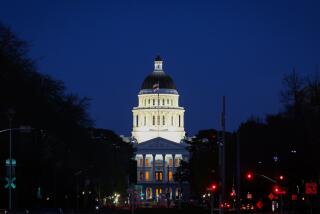U.S. may ease state budget gap
SACRAMENTO AND WASHINGTON — The economic stimulus package congressional leaders are drafting would wipe out nearly a quarter of California’s budget shortfall, a potential windfall that could help end the impasse over how to close the nearly $42-billion gap.
The House bill, which is likely to be voted on next week, would bring the state more than $11 billion in healthcare and education money that could go directly to reducing the deficit through mid-2010, state officials learned Thursday night.
“This takes a big bite out of the state’s budget gap,” said Jean Ross, executive director of the California Budget Project, a Sacramento-based think tank. “It is better news than many of us had anticipated.”
The money would come from the $825-billion stimulus package that President Barack Obama has made a top priority. The package would also increase spending in California into 2011 for various federal programs, such as job training and food stamps.
The amount of money slated for California could change, however. The Senate is preparing to write its own version, and Republicans are increasingly objecting to the plan, saying it would not do enough to stimulate the economy.
But congressional Democrats hope to send a bill to the White House by Presidents Day.
“The president asked for action, swift and bold. That is what we are doing,” House Speaker Nancy Pelosi (D-San Francisco) said Thursday. “The American people are in a desperate situation.”
Most of the money that California could use to whittle down its deficit would come in the form of healthcare spending. According to an analysis by the Washington, D.C.-based Center for Budget and Policy Priorities, California’s Medi-Cal healthcare program for the poor would get a $7.3-billion boost through the coming state fiscal year. The money is intended to keep states from cutting the programs as they struggle with ballooning deficits.
The state is also positioned to receive nearly $4 billion in education spending. Budget analysts said that money can also be used by state officials to help limit cuts in existing school programs.
“It will be a huge help to us in resolving our current fiscal problems,” state Senate President Pro Tem Darrell Steinberg (D-Sacramento) said.
But he and Assembly Speaker Karen Bass (D-Los Angeles) warned that it solves only part of the state’s problem and lawmakers are running out of time to deal with the rest. “We have to make really horrible cuts, and we have to raise revenue, but we are just hoping whatever we get will help us avoid deeper cuts,” Bass said.
State Controller John Chiang plans to suspend payment of tax refunds, college grants and some welfare checks if lawmakers do not take action by Feb. 1. The state, he says, simply won’t have the cash to cover them.
Legislative leaders on Thursday met with Gov. Arnold Schwarzenegger to discuss the budget in their first joint meeting in nearly a week. The three-hour discussion failed to produce any agreement.
Not everyone is pleased by the House bill.
The huge amount of proposed spending has drawn criticism from congressional Republicans, who say the $825-billion package should be weighted more heavily toward tax cuts, which currently account for only a third of it. Some members of both parties also want more money to go to road projects.
“Are we fostering job creation and economic stimulus or are we simply growing the size of government?” said Rep. Jerry Lewis of Redlands, the top Republican on the House Appropriations Committee. “All of this spending will place a tremendous burden of debt on present and future generations.”
Obama is scheduled to meet today with congressional leaders from both parties to discuss the package.
In addition to the funds that would help cut the deficit, California would receive about $2.8 billion for highway projects and about $950 million for transit under the measure, according to the House Transportation and Infrastructure Committee. That spending is intended for projects that are ready to go in order to move money into the economy quickly. But it also would allow projects that have been delayed because of a shortage of money at the local or state level to move ahead.
State budget analysts say much of that money may not make it to California until next year and the year after, as many of the state’s big transportation projects are still in the design-and-planning stage.
The House bill would also provide California with $435 million for clean-water projects, such as those aimed at preventing beach pollution. There would also be $45 million in energy assistance to help low-income families pay home heating and air-conditioning bills.
The state is likely to receive a large portion of the $850 million that would be provided nationwide to reduce wildfire risks.
--
Times staff writer Patrick McGreevy in Sacramento contributed to this report.
More to Read
Get the L.A. Times Politics newsletter
Deeply reported insights into legislation, politics and policy from Sacramento, Washington and beyond. In your inbox three times per week.
You may occasionally receive promotional content from the Los Angeles Times.












